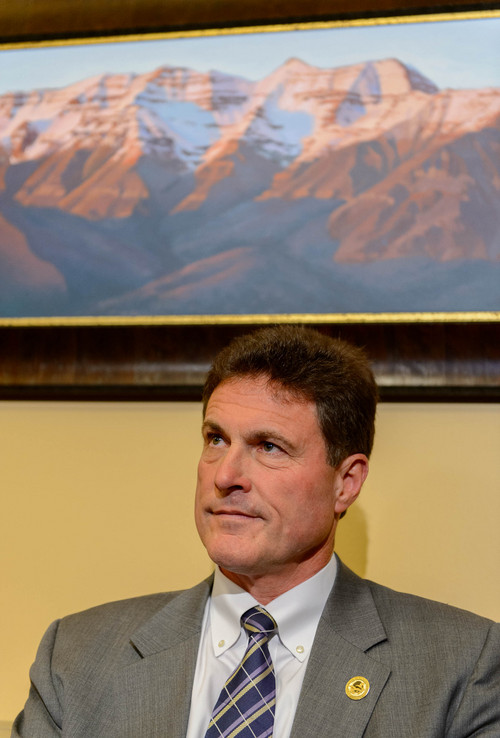This is an archived article that was published on sltrib.com in 2014, and information in the article may be outdated. It is provided only for personal research purposes and may not be reprinted.
When Utah Gov. Gary Herbert proclaimed that "doing nothing" about a possible Medicaid expansion "is not an option," low-income advocates cheered and national news outlets declared the matter decided.
But days later, House Speaker Becky Lockhart, R-Provo, opened the 2014 legislative session with a hard-line response, rejecting any expansion plan that depends on federal funding.
Since those opening salvos, negotiations over one of the most contentious and significant decisions of the session have happened behind closed doors.
"We're kicking around various ideas but waiting for cost data on some of them. Nothing's ready for prime time," said Rep. Jim Dunnigan, R-Taylorsville, co-chair of a legislative task force charged with recommending solutions.
Rep. Dean Sanpei, R-Provo, another task force member, said there seems to be some agreement over paying to plug a coverage gap affecting Utahns with incomes under the poverty level — who are ineligible for Affordable Care Act subsidies on the federal health exchange. The federal law excluded them, anticipating states would extend Medicaid coverage to such poor residents.
"We want to try to find a solution," Sanpei said, "but there's not consensus on how to do that and there's even less consensus on how to fund that."
He said there are several options: Do you give them state subsidies to buy coverage or cover them with Medicaid funds? Another idea: Cover them with some sort of extension of "UPP," a state program that uses Medicaid funds to help employees pay their monthly premium to enroll in workplace health benefits.
Also up for debate, said Dunnigan, is where these individuals would shop for insurance: Utah's small-business exchange, Avenue H, or the federal http://www.healthcare.gov.
Adding another complication, according to Sanpei: "Do you treat that entire population the same or do you look at alternatives designed to target the most vulnerable in the population, like the medically frail or uninsured parents with children?"
If parents get sick and have to stop spending money on food and clothes, that hurts the children, he explained.
Overshadowing the entire debate, however, is the question of funding.
Tapping state funds frees Utah from certain federal constraints, giving it room to innovate.
"To the degree we only look at state dollars," Sanpei said, "then we start focusing on where the needs are greatest."
But it also means forgoing billions in funding over the next decade.
Utah taxpaying individuals and businesses (mostly in the health industry) are going to fork over $6.4 billion in federal, Affordable Care Act-related taxes during that time frame, according to University of Utah Health Care CEO Vivian Lee.
"If Utah opts into the expansion, we get $3.5 billion back. If we don't, we get zero back," she said. "We're subsidizing other states if we don't do the Medicaid expansion. It's not like we're going to get that money back on our taxes."
Utah hospitals have voiced support for a "private option" alternative embraced by Arkansas, Iowa and a growing number of other states.
The idea is to use public dollars to buy private insurance for residents with incomes under the poverty level, leaving those who earn up to 138 percent of that level to shop with federal subsidies on the federal health exchange.
Herbert said Thursday that he likes the Arkansas plan, adding it doesn't matter if it's done with state or federal dollars.
Speaking for himself, Sanpei agreed, it's "a very viable and reasonable option." But he said the feds don't like it because subsidies are more expensive for them than funding a Medicaid expansion and it's not how they envisioned the coverage under the health law.
If the state wanted to go that route, it would need to get a waiver from Health and Human Services, or else the feds may not foot 100 percent of the expansion bill, he explained.
Further muddying the equation are Senate Republicans who haven't taken the same position as the House speaker.
"We're not here, we're not there. We're in the learning process," said Senate President Wayne Niederhauser, R-Sandy.
Senate Majority Leader Ralph Okerlund, R-Monroe, said, "There's still a bunch in the caucus who don't want to do anything" and leave Medicaid eligibility rules as they are now.
Niederhauser said the argument against forgoing federal funds has merit.
"That comes right out of the economy," he said, "so it seems compelling maybe we get some of that back." But, he added, "Is it worth taking more money from the federal government?"
Sanpei expects in the next few days to have the core of a proposal for leaders to start to "coalesce around."





